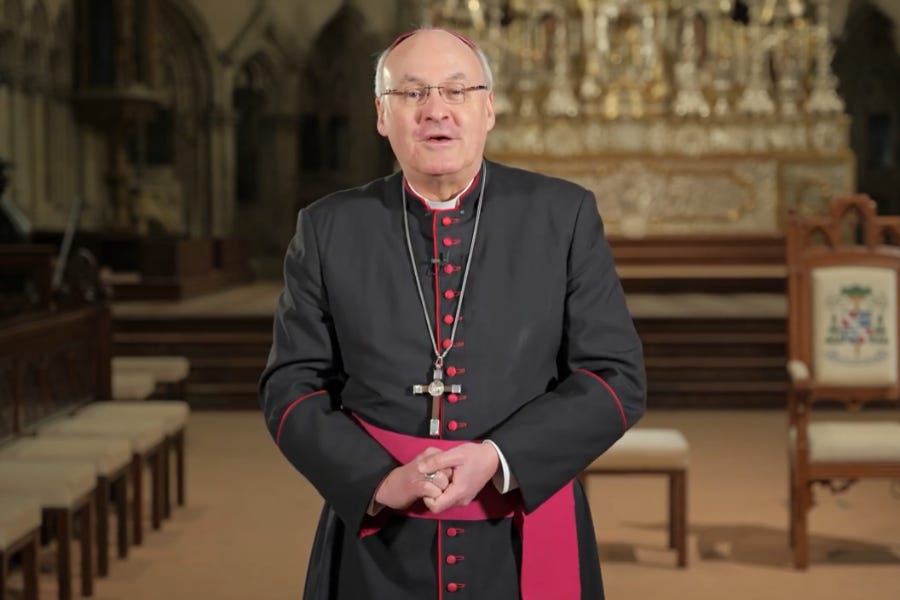Two more German dioceses reject schools document
Description
Two more German dioceses have rejected a document on “the diversity of sexualities” in schools published by the German bishops’ conference in October.

The Archdiocese of Cologne and the Diocese of Regensburg confirmed Nov. 14 that they agreed with Bishop Stefan Oster of Passau’s detailed critique of the bishops’ conference text, “Created, Redeemed, and Loved – Visibility and recognition of the diversity of sexual identities in schools.”
Oster argued in a Nov. 10 analysis that the document, issued by the bishops’ conference’s commission for education and schools, marked a departure from the traditional Catholic understanding of the human person.
The Cologne archdiocese, led by Cardinal Rainer Maria Woelki, said it endorsed Oster’s commentary on the text, particularly regarding the document’s “anthropological and theological implications.”
The Regensburg diocese said that its Bishop Rudolf Voderholzer, a professor of dogmatic theology, “concurs with Bishop Oster’s assessment.”
In comments on the sidelines of the Nov. 14-15 plenary assembly of the State Committee of Catholics in Bavaria, Voderholzer also voiced procedural criticisms.
He said that members of the bishops’ conference’s permanent council had requested changes to a draft of the text, but it was published almost unchanged “in our name.” The permanent council consists of Germany’s 27 diocesan bishops or a delegated auxiliary bishop and meets five or six times a year.
“An agenda is being pushed here. I don’t want to hear in 30 years that the Catholic Church went along with it again,” Voderholzer commented.
He suggested that the schools document, released Oct. 31, was emblematic of the 2019-2023 “synodal way,” which brought together German bishops and select lay people to discuss far-reaching changes to Church teaching and practice.
He said: “I don’t get the impression that people are listening to each other and working together to achieve what we have been entrusted to do. Instead, a political agenda is being pushed through come hell or high water.”
Voderholzer, Woelki, and Oster are established critics of the synodal way and the changes introduced in the Catholic Church in Germany in the initiative’s wake.
Along with the now-retired Bishop Gregor Maria Hanke of Eichstätt, the trio refused to join a post-synodal way committee that is drawing up plans for a new permanent synodal body in Germany.
The three bishops’ dioceses also rejected national guidance on blessings for unmarried and same-sex couples published in April, arguing that the document went beyond the norms of the 2023 Vatican declaration Fiducia supplicans.
The new schools document was prepared in response to two resolutions approved by synodal way participants. One called for “a re-evaluation of homosexuality in the Magisterium,” while the other focused on “dealing with gender diversity.”
“Created, Redeemed, and Loved” offered recommendations for students, teachers, religious educators, pastoral workers, and school leaders in relation to “the diversity of sexual identities” in educational institutions. It ended with a glossary of terms, such as “heteronormativity,” “rainbow family,” and “sexual self-determination.”
According to German Catholic media, the document had a contentious path to publication.
In early summer, a draft was presented to the permanent council. The German Catholic news agency KNA reported that the discussion was “very controversial,” with some critics calling for the text to be abandoned.
A German source familiar with the workings of the bishops’ conference’s commission for education and schools told The Pillar that the body was considered to be among the less high-profile of the bishops’ 14 commissions. Its membership consists of one diocesan bishop — its chairman, Bishop Heinrich Timmerevers of Dresden-Meissen — four auxiliary bishops, and six lay people.
The source said that when the draft was initially submitted to the wider group of bishops, several highlighted what they believed were serious theological and ethical deficiencies and returned the text to the commission requesting changes.
According to the source, the text’s authors made minor revisions but did not resubmit the new draft to the broader group of bishops. It was then published on the bishops’ conference’s website, presented as an official document of the German bishops.
In his critique of the document, Oster said he had read a draft and proposed that it be supplemented with reflections on Christian identity.
“The response was essentially negative,” he said.
Oster was a surprise guest at a meeting of representatives of the German bishops’ conference and Vatican officials in Rome Nov. 12. The gathering focused on plans to establish the new synodal body in Germany, known as the “synodal conference.”
Germany’s interim synodal committee will hold its fifth meeting in Fulda Nov. 21-22. Members are expected to decide whether to approve statutes of the new body.





